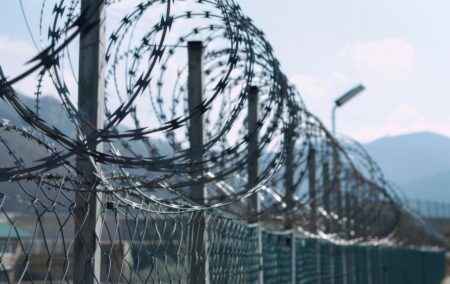The issue of border control is currently somewhat contentious. Presidencies will be decided, elections lost, friends and families divided over this one issue.
A border is defined as “a line separating two countries”; a boundary is defined as a line which marks the limits of an area. A border is specifically a concept attached to the nation-state; a boundary is much more flexible but attached to the concept of property rights.
Should states restrict movement across their borders? Are individuals entitled to defend their property boundaries?
Borders
Borders are often arbitrary lines on a map. This is best demonstrated by many of the borders in Africa, the consequence of arbitrary, violent colonial edicts. They often cut through and divide societies, nationalities – even families. They need to be maintained, defended, and enforced by the states enclosed within them, usually at great cost to the individuals in that state.
The justifications for well-enforced borders seem so obvious to their advocates that they cannot conceive or tolerate an alternative; We can’t just let anyone in. We will be overwhelmed. They are not like us. They have different standards, religions, and customs. They are poor so who will pay for them?’
Let’s deal with each of these issues:
We can’t just let anyone in
It turns out you can. The concept of a worldwide passport standard is relatively new, created in the aftermath of the First World War. Prior to that there was no consistent standard of border enforcement. A mediaeval peasant had more rights to travel freely than a modern citizen. America let millions of impoverished Europeans and others into the country in the 1900s with only token restrictions. Huge refugee populations moved around Europe in the aftermath of the Second World War. After the collapse of the Berlin Wall, millions of East Germans became citizens of West Germany. The needs of desperate individuals trump the protection of borders.
They are not like us
This is the rallying cry of fascists and racists throughout the ages. This ignores the fact that everyone in the West is descended from just 22 wandering individuals in the Stone Age. Nature itself values diversity of origin above uniformity. The reason we don’t marry our siblings and cousins is that they are too much like us. The whole point of travel is to meet people with different behaviours and customs, and to share ours. Uniformity is not just boring; it is genetically dangerous.
We will be overwhelmed
This has become a real fear for existing populations in the United States and Europe. Demagogues pound this drum constantly. Unscrupulous politicians and power brokers use immigration to bolster electoral support. At least 5% of any population consists of violent criminals and psychopaths, including immigrant populations.
How do we deal with the psychopaths in our existing population? We deploy about 15% of the population to police the dangerous 5%. In a civilised society, we identify them, try them, and incarcerate the guilty. Why should we stop doing that just because they are immigrants?
Who will pay for them?
Most refugees start poor, but subsequent generations pay for themselves many times over. Statistics from the United States prove this true of many immigrant populations such as Jews, Italians, Greeks, and Germans. However, if target destinations insist on giving free stuff to all and sundry, then many will take advantage of this misplaced compassion. If target destinations give a special pass to immigrants, or suspend the rule of law, they have only themselves to blame.
The morality of movement, the ethics of immigration
I believe in freedom and justice for all individuals, not just the ones who think and look like me; except for Africans, we are all immigrants. All our ancestors constantly moved into new territories hoping to improve their circumstances, sometimes at a cost to the current occupants. Trying to pull up the drawbridge behind you is unjust hypocrisy; it is generally futile too. Resources you could have shared with the new arrivals are now spent fighting them, to the detriment of all.
Of course, there is a profound difference between peaceful immigrants and hostile invaders. Invaders must be resisted, preferably long before they cross your borders. Throughout history, nations have employed immigrant populations to help them defend their borders.
Nations that accept and incorporate migrants commonly survive and prosper. Nations that drive their populations to emigrate commonly fail. I am on the side of the individuals who are the meat in this sandwich, often through no fault of their own. Perhaps because I fear becoming an emigrant from a failing state soon…
Boundaries
A boundary marks the limits of physical property you legally acquire and own. It is your responsibility to define and defend your boundaries. Property defined by boundaries is the basis of the free market system, and by implication, individual freedom. It does not require state intervention, but it may be forced upon the owner, like so many other injustices.
From negotiation to outright lawfare, disputes over property boundaries will be resolved by the systems native to that society. The state may become involved because of its mandate for violence, but is not intrinsically necessary, as can be seen in many state-free jurisdictions.
In a truly free society, property rights will be protected by boundaries enforced by owners. Currently borders are simply imaginary lines enclosing land claimed by a state entity.
The views of the writer are not necessarily the views of the Daily Friend or the IRR.
If you like what you have just read, support the Daily Friend

